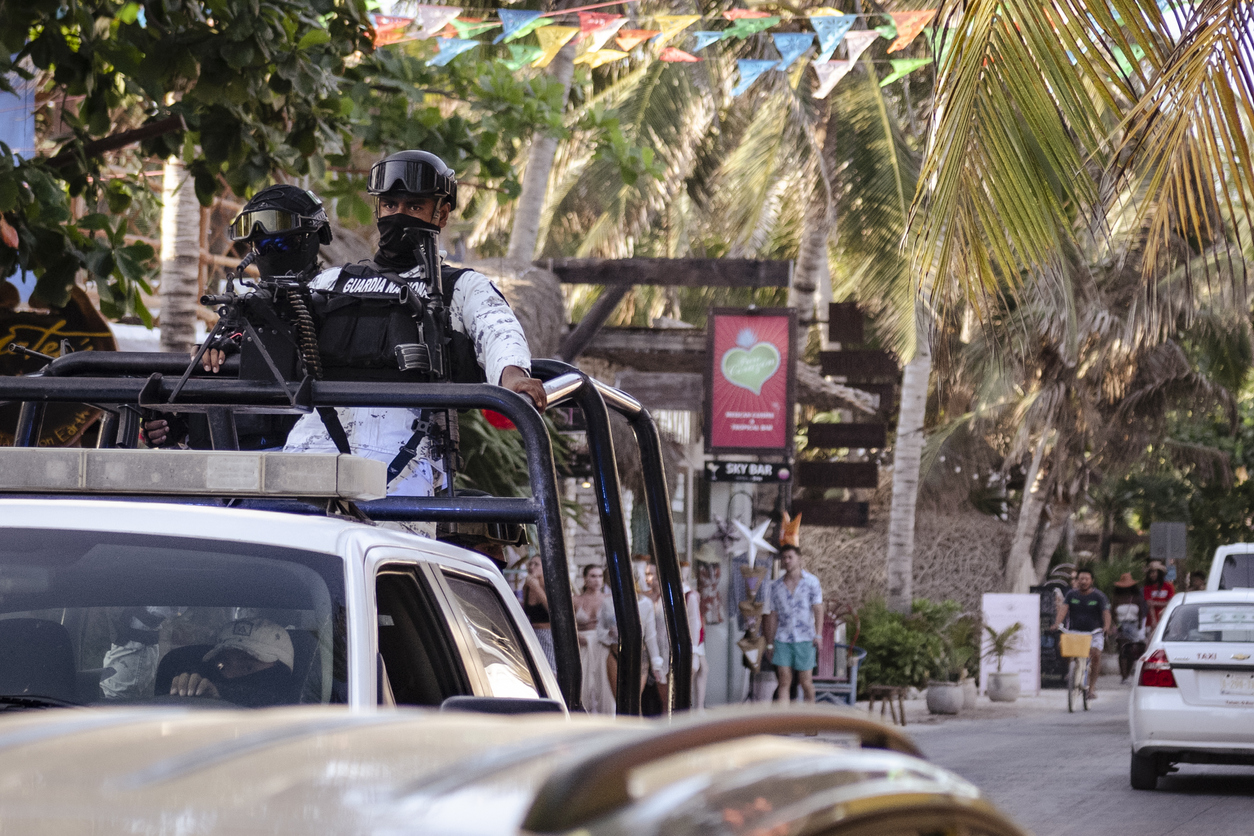The rise in cartel activity in Mexican resort cities has marked a significant shift from previous practices where such areas were considered off-limits to cartel violence to protect the lucrative tourist trade. This change has led to increased incidents of violence, including attacks against tourists, in once peaceful destinations. The situation is fuelled by disputes over drug trafficking territories and power struggles between major cartels, such as the Jalisco New Generation Cartel (CJNG) and the Sinaloa Cartel, leading to heightened levels of violence in tourist hotspots like Cancún and Tulum.
Despite Cancún not ranking among the top 25 municipalities in Mexico for crime rates, its murder rate remained stable from 2020 to 2021, with 38 murders per 100,000 inhabitants. This violence, while primarily targeted against cartel members, local residents, and authorities, has seen rare but concerning spill-over effects on tourists. For instance, incidents in Tulum have shown a significant increase in homicides, highlighting the encroachment of cartel violence into areas known for their tranquility and attracting international visitors.
Puerto Vallarta is another example where the CJNG has entrenched itself, using local businesses for money laundering and running extortion operations. This has turned the city into a strategic stronghold for the cartel, affecting the local economy and security. Similarly, the state of Quintana Roo, home to famous resort destinations like Cancún, has witnessed a surge in violence, attributing to the lack of centralized control among competing criminal organizations. This anarchical state replaces previous unspoken agreements among cartel leaders to keep tourist areas peaceful.
Notable incidents highlighting the risk to international tourists include the targeted killings in Tulum related to organized crime connections and drug trade debts. Such incidents underscore the direct threat to tourists, especially those from countries like Canada, involved in or connected to illegal activities.
Resort areas at the highest risk include Cancún, Tulum, and Puerto Vallarta, where cartel operations have become more visible and violent. To protect themselves, travellers should stay informed about the security situation in their destination, avoid areas known for drug trafficking or cartel activity, and follow travel advisories issued by their governments. Engaging with local authorities or security services about the safest areas to visit and staying within resort premises during high-risk periods can also mitigate exposure to violence.
While Mexican resort cities continue to attract tourists with their beautiful beaches and vibrant culture, the increasing cartel activity demands heightened awareness and precautions from visitors to ensure their safety amidst the changing security landscape.
Canadians travelling to Mexico for vacation and business represent a significant portion of international visitors to the country, drawn by its diverse attractions, cultural richness, and business opportunities. However, safety concerns in Mexico, stemming from issues like crime, drug trafficking, and political instability, have become pertinent considerations for travellers.
Mexico offers a wide range of destinations, from bustling cities like Mexico City and Guadalajara to popular beach resorts in Cancun, Playa del Carmen, and Cabo San Lucas. The country's rich cultural heritage, vibrant culinary scene, and scenic landscapes make it an attractive destination for both leisure and business travellers. In recent years, there has been a surge in business travel to Mexico, particularly in sectors such as automotive, manufacturing, and tech industries, due to Mexico's growing economy and trade agreements with Canada.
However, safety issues have been a growing concern. Certain regions of Mexico are known for higher levels of crime, including violent incidents related to drug cartels and organized crime. The U.S. Department of State and Canadian government regularly issue travel advisories highlighting areas of concern. States such as Guerrero, Michoacan, Colima, Sinaloa, and Tamaulipas often feature in these advisories due to higher risks of crime and kidnapping.
For vacationers, the safety in and around popular tourist resorts is a critical issue. While many resorts in Mexico are located in areas considered safer and more insulated from the broader security issues, incidents have occurred in tourist areas. The Mexican government has made significant efforts to bolster security in these regions, recognizing the importance of tourism to the national economy. Resorts often employ extensive security measures, including private security personnel, to ensure the safety of their guests. However, travellers are advised to remain vigilant, especially when venturing outside of the resort areas, and to follow the guidelines provided by local authorities and tour operators.
Travellers are also advised to keep abreast of local news and updates from their respective governments regarding safety and security in Mexico. It's recommended to register with national consulates or embassies when travelling for extended periods or for business purposes. This registration can provide an added layer of security and facilitate assistance in case of emergencies.
Additionally, it is important for travellers to be aware of health-related issues, such as food and water safety, and to take necessary vaccinations before travelling. The COVID-19 pandemic has also added a layer of complexity to travel, with requirements for testing and potential quarantine measures.
While Mexico remains a popular destination for Canadian travellers, both for vacation and business, it is crucial to be well-informed about the varying safety conditions across different regions of the country. Exercising caution, staying informed about the current situation, and adhering to travel advisories are essential for ensuring a safe and enjoyable experience. For those visiting resorts, reliance on established security measures and vigilance in and around these areas can significantly mitigate risks.
At BlueSky, we are committed to delivering comprehensive, real-time intelligence to our clients travelling internationally. Our services include thorough pre-trip due diligence to prepare you for your journey, as well as continuous monitoring during your travel, ensuring your safety and informed decision-making at every step. This is all part of our BlueSky Travel subscription. For further information on upgrading your subscription or if you have any additional inquiries, please do not hesitate to contact us directly at [email protected].







